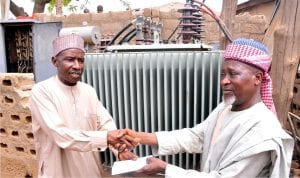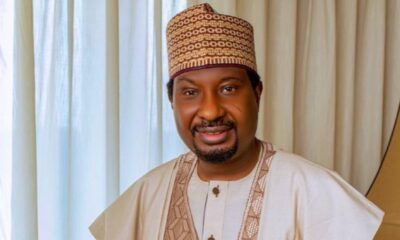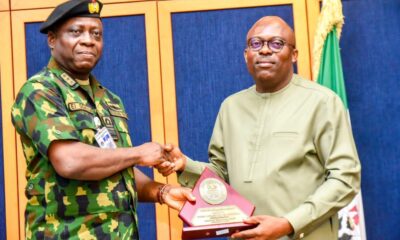Business
Towards Reforming Nigeria’s Power Sector

Representative of Senator Shehu Sani, Alhaji Suleiman Ahmed (left), presenting 500kva transfomer to the district Head of Badarawa Majalisa Kwaru, Alhaji Abdulhameed Giwa in Kaduna recently.
It is disheartening that in
spite of the partnership the Nigerian government has established with the private Electricity Distribution Companies (DISCOs) and the huge sums invested in the power sector by the previous administration, the DISCOs still lack the capacity to carry out their own mandates. That is the mandate of ensuring regular or steady electricity supply to the populace of Nigeria.
Prior to the handover of the power sector to the DISCOs, the Federal Government and the United States had on August 9, 2011 agreed on the critical nature of the sector to economic growth in Nigeria.
The agreement was reached at the second meeting of the Working Group on Energy and investment of the US – Nigeria Binational Commission in Abuja. Nigeria was represented at the meeting by top officials of the Federal Ministry of Petroleum Resources headed by the Permanent Secretary, Engr. Goni Sheikh, while the U.S. team was headed by the State Department’s Special Envoy for International Energy Affairs, Ambassador Carlos Pascual.
The two nations reaffirmed their commitments to continue to cooperate in implementing the reform of the power sector and instituting best practices to ensure optimal performance of the sector and to attract needed investment. Recognizing the need for private sector participation in power sector generation, transmission and distribution, both countries acknowledged that renewable energy has an important role to play in rural electrification. They also realized that by reducing gas flaring and monetizing its resources, Nigeria would enhance its clean electricity generation.
Both Nigeria and the US at the meeting stressed the importance of the Global Alliance of Clean Cooking Stoves and affirmed their support to introduce fuel-efficient cooking stoves, especially to rural communities in Nigeria.
The government of the US pledged to continue working through the US Agency for International Development to enhance capacity building in support of private sector participation in Nigeria’s power sector. The Nigerian government on its part pledged to work toward a timely and comprehensive reform of the petroleum sector, recognising the critical benefits to Nigeria of a stable and transparent investment framework that upholds global standards of sanctity of contracts and comparable taxation regimes.
The United States recognized Nigeria’s leadership in attaining the status of Extractive Industries Transparency Initiative (EITI) compliant country and both sides pledged to work together to continue the process of ensuring the adoption of transparent rules and regulations in the extractive industries sector. The US team briefed the Federal Government on developments in the United States, including the Cardin-Lugar Energy Security Through Transparency Provision to the 2010 Wall Street Reform and Consumer Protection Act, which complements the work of the Extractive Industries Transparency Initiative.
Diversification from the national grid system into other alternative energy sources is another solution advanced for the reform in the power sector of Nigeria. The Managing Director of Ola Electrical Nigeria, a solar energy company, Mr. John Sola while speaking in an interview with The Tide said if Nigeria breaks from the grid system and adopts other alternative sources, more persons would participate in the power distribution and supply thereby allowing consumers to make choice.
According to him, the rivers, good climate with adequate sunlight and coal, among other sources could be transformed to electricity to serve the people. He said “if people begin to tap the abundant electricity or power resources, Nigerians will enjoy sufficient and cheap energy sources without necessarily expecting light from the national grid.
Sola noted that technology and finance remained the major challenges confronting prospective investors and urged the government to support them to invest in alternative power sources.
“Until the issue of power supply is properly addressed, the idea of accelerated development will remain a mirage in the country”, he said.
In their effort, the new investors in the country’s electricity generation and distribution have injected over N300 billion into the power sector in the last two years. Egbin Power Plc on its own has invested N50 billion to rehabilitate line six of its Lagos plant to generate extra 240MW. The Director-General of the Bureau of Public Enterprises (BPE), Benjamin Ezra Dikki, who disclosed this when he featured on Nigeria Television Authority’s (NTA) live programme- Good Morning Nigeria last year, pointed out that the investment was for the upgrade of power infrastructure which had become obsolete over the decades, noting that new technologies evolving gains in the sector would not manifest overnight.
He explained that unlike reforms in other sectors, which brought immediate results, the situation in the power sector requires time due to its capital intensive profile. As he put it, “power equipment like turbines and other ancillary products cannot be bought off the shelf. The investors have to place orders after which it will take between three to four months to manufacture the equipment before shipping. This takes time. Before Nigerians will begin to see dramatic changes in the power sector, it will take between two to three years. But already, significant impact has been made”.
The BPE Director-General said that because of the infrastructural dev- elopement by the investors, power interruptions in the country had reduced to the barest minimum while over 2,000 engineers and technicians had been employed since takeover. Dikki noted with regret that for over 16 years as a public monopoly, Power Holding Company of Nigeria (PHCN) neither employed nor bought in new investments into the sector. He also regretted that gas vandalism was impacting negatively on the plans to privatize the Nigeria Independent Power projects in the country.
Dikki, however, expressed optimism that with the new initiative put in place by the former President Goodluck Jonathan’s administration to safe-guard the pipelines through technological devices, the challenge would soon be surmounted, adding that the complaint of non-availability of electric meters to consumers was hinged on the complex technology used in producing smart meters, which are currently being used the world over.
The Director-General of the National Power Training Institute of Nigeria (NAPTIN) Reuben Okeke announced that the German government has built a 25 kilowatts power plant for the training of Nigerian engineers in renewable energy.
Okeke who announced this at a meeting with management team of the Nigerian Society of Engineers (NSE) in Abuja said Nigeria is expanding its local capacity to train technical workforce for the power sector while aiming to become a regional hub for required expertise in the electric power drive. To achieve this, he disclosed that the nation is equipping its power training centres with state-of-the-art simulators and training equipment, including electricity laboratories.
According to him, the NSE is collaborating with the NAPTIN to check quackery in the power sector and explained that the institute aimed to promote local skills above their foreign counterparts. “Our training plant is stationed at the Kainji Power Plant, Niger State and we have acquired a unique 450 mega watts combined circle simulator stationed at the Afam Power Plant in Rivers State to train mechanical and electrical engineers from Nigeria and other African countries. The facilities are for teaching and learning for renewable energy. There are also three wind turbines of 5 kilowatts each, and 10.5 kilowatts of solar PV to be operated as a hybrid.
“Renewable energy is one of the things that the Federal Government has decided for rural access ‘Operation Light Up Nigeria’, and we have to have, as well as establish where those who will operate, manage and maintain these facilities will be trained”, he said, adding “we are as well getting a complete electrical training laboratory in Kano, and we currently have about 3-4 of our instructors in Italy to master how to use this to teach”.
Okeke noted that Nigeria has huge potentials as far as human resources are concerned.
“We cannot go anywhere to import cables. NAPTIN has to be positioned in such a way as to satisfy the market, and we have collaborated with NSE and entered a pact towards ensuring that engineers in the power sector go through rigorous tests and examination”.
He stated that both bodies signed a memorandum of understanding in 2014 to make sure that young engineers in the power sector are well trained and well evaluated, adding “no matter the investments the federal government makes in any endeavour, particularly in the power sector, without the human capital, without the workforce, well trained and capable workforce to maintain the infrastructure, it will not work”.
Shedie Okpara
Maritime
Shippers’ Council Registers 160 Port Operators

The Nigerian Shippers Council (NSC) says it has registered 160 Port stakeholders into its Regulated Port Service Provider and Users platform since the initiative began in 2023.
Executive Secretary, NSC, Mr Pius Akutah, made the disclosure on the sideline of a sensitisation programme by the commission for port operators in Lagos, with the theme, “Regulated Port Service Provider and Users”.
Represented by the Director, Consumer Affairs, Chief Cajetan Agu, Akutah emphasised the significance of the programme for stakeholders.
He said the sensitisation programme was the second edition after its commencement during the last quarter of 2023.
The Secretary said the 160 registered port operators consist of agencies, terminal operators, shipping companies, individual port users as well as service providers.
“We invited the ports stakeholders for enlightening them on the processes for online registration of Regulated Port Service Provider and Users.
“We have demonstrated to them how to register and how to make payment and we were able to present before them the various categories of the registration.
“The rate of payment is also in the registration. The payment of each group depends on the operation. A shipper pays N30,000, terminal operators and shipping companies pay N300,000, truckers also pay N30,000, while some pay N50,000 and N100,000.
“The Council was able to intimate them on the benefits, because port users benefit more as we help to interface on reducing port charges from time to time”, Akutah said.
He said that there was a need to continue to work with port operators to stop delays and eliminate high costs to make the port efficient.
Also speaking, the Deputy Director, Stakeholders, Service, NSC, Mr Celestine Akujobi, said “the sensitisation exercise was important for the council to enable us bring all the port stakeholders together”.
According to him, this is to avoid challenges during the implementation of the council’s responsibilities.
“By the time we introduce sanctions on defaulters, no operators will complain that he or she is not aware of the registration.
“I’m happy with the turnout of this sensitisation. This shows that the operators are well informed of the statutory friction of the council as the port regulator.
“The final implementation will commence as soon as we discover that all the operators have keyed into the portal.
“We are engaging other ports across the country and we’re hopeful that before the last quater of 2024, the council will implement sanctions on defaulting operators”, Akujobi said.
Earlier, Vice Chairman, National Association of Government Approved Freight Forwards (NAGAFF), Dr Ifeanyi Emoh, said port challenges were enormous, adding that they originated from some of the government agencies.
Emoh urged the council to look into regulating other government agencies, so that there could be a window through which they can collect port charges collectively instead of indiscriminately.
By: Chinedu Wosu
Business
Chivita, Hollandia Reward Outstanding Trade Partners At Annual Conference

Chivita| Hollandia (CHI Limited) leading fruit juice and value-added dairy manufacturer in Nigeria has rewarded its long standing distributors at the recently held 2024 Distributor Conference. The event with the theme, “Break Boundaries Exceed Expectations” served as a platform to recognise and reward the exceptional contribution of the distributors and wholesalers who play a critical role in Chivita|Hollandia (CHI Limited) success and business goals for the year.
The Distributor Conference was held in two sessions. While the morning session featured keynote addresses, industry insights and brand immersion experience, the evening session was a cultural display of elegance and funfair that culminated in the award presentation and recognition of the contribution the trade partners made to the company in the 2023 year under review.
A key highlight of the event was the award ceremony which acknowledged outstanding trade partners in various regions across the country. The awards recognized commitment, dedication, and outstanding performance in areas of sales growth, brand promotion, and market expansion.
Eelco Weber, Managing Director, Chivita|Hollandia (CHI Limited), stated that the company’s success story is incomplete without the strong partnerships it has built with trade partners. “Today, we celebrate not only the achievements, but the collaborative spirit that has made our growth possible” he said.
Bola Arotiowa, Chief Commercial Officer, Chivita|Hollandia (CHI Limited), in his statement revealed that, the event which was first of its kind will continue to be an annual meeting to enable the company work more closely with its distributors, share insights and action points, help the trade partners familiarize themselves with the company’s goals and objectives for each year, and serve as a driver for mutual success.
“Our distributors are the backbone of Chivita|Hollandia (CHI Limited). Their relentless efforts in distributing our products, promoting our brands, and expanding our reach across the nation is truly commendable. As the bridge between us and our valued consumers, it is very important to reward their hard work and dedication for being an essential part of the Chivita|Hollandia (CHI Limited) family. Together, we will continue to deliver great products to our conusmers which in turn will deliver value to them”, Mr. Arotiowa added.
Speaking at the conference, HajiyaBilikisuSaida, Chief Executive Officer of Smabirm Nigeria Limited, who won the Outstanding Distributor of the Year in North 1 region, and got a reward of two million Naira worth of Chivita|Hollandia (CHI Limited) products expressed delight at the company’s recognition, and stated that the awards served as a way to inspire distributors to do more and put in more effort, which in turn would help both the distributors and the company to grow.
Other outstanding performance distributors of the year rewarded with a two million Naira worth of Chivita|Hollandia (CHI Limited) stock include, Sunny Chuks Limited for East 1 region, MRS FA & Sons Limited for East 2 region, Hussakas Ventures for North 2 region, Rookee 1388 Ventures for Lagos 1 region, Pik N Pil Ventures for Lagos 2 region, FaithJoe Event Management Limited for West 1 region, and Progress Family Nigeria Enterprise for West 2 region.
The annual Distributors Conference aims to strengthen the bond between Chivita|Hollandia (CHI Limited) and its trade partners. This collaborative approach fosters mutual growth and ensures the continued success of the brands in the Nigerian market.
Business
AXA Mansard Backs Female-Owned MSMEs With N1.4m Grant

A global leader in insurance and asset management, AXA Mansard, has supported three female-owned MSMEs with business grants totaling 1.4 million to boost their operations.
This, the company said, is part of its commitment to women and the Medium, Small, and Medium-scale Enterprise (MSME) sector in the country.
The three businesses were successful at the International Women’s Day Pitch Competition, organised in partnership with SME 100 Africa in Lagos.
According to the Head of Marketing, AXA Mansard, Olusesan Ogunyooye, the competition, which is aimed at supporting female entrepreneurs in Nigeria, “is another way AXA is demonstrating its commitment to the causes of women and stimulating the MSME sector in Nigeria”.
The business pitch competition received numerous entries from women across different sectors, but after a rigorous selection process, shortlisted participants were selected to participate in the competition.
Ogunyooye said “the programme provided a unique opportunity for women from various works and socio-economic classes to showcase their innovative ideas and solutions in sectors such as food, tech, fashion, and fragrance, creating an atmosphere filled with excitement, enthusiasm, and a strong sense of community”.
He stressed the importance of investing in women, saying it is not just the right thing to do, but also aligns with AXA’s purpose of acting for human progress.
He explained that AXA believes the future of women should not be at risk, hence investing in their economic empowerment is a crucial part
-

 News4 days ago
News4 days agoJAMB Arrests Father For Impersonating Son At Exam Centre
-
Women4 days ago
The Desire Of Every Woman In Marriage
-

 Nation23 hours ago
Nation23 hours agoSenate Frowns Over Continued Depreciation Of Naira
-

 Business20 hours ago
Business20 hours agoChivita, Hollandia Reward Outstanding Trade Partners At Annual Conference
-

 Politics19 hours ago
Politics19 hours agoConstitution Amendment: Senator Barau Urges Stakeholders’ Collaboration
-

 Featured4 days ago
Featured4 days agoBe Firm In Fight Against Oil Theft, Fubara Tells CNS …As Navy Moves Training Hqtrs To Rivers …Seizes 14 Vessels In Three Months
-
Business4 days ago
Diri Tasks NCDMB, SPDC On Projects Completion
-

 Rivers23 hours ago
Rivers23 hours agoCustomary Jurisprudence: CCA President Harps On Fair Hearing Importance

